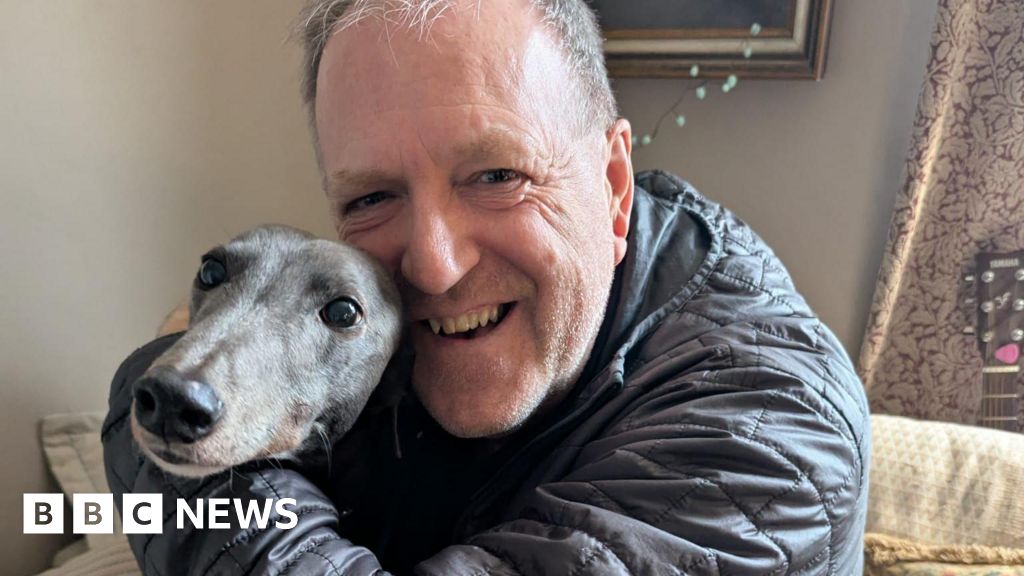BBC News
Essex Havard adopted Jilly after she lost her leg in a race
A man who adopted a greyhound that lost a leg while racing believes the “cradle to grave” attitude towards the breed must change.
Essex Havard, 58, from Cardiff, first met Jilly six years ago when she was dumped by her owner after breaking her leg.
The Welsh government announced on Tuesday the sport would be banned “as soon as practically possible” and was not “impossible” before the next Senedd election in 2026.
The Greyhound Board of Great Britain (GBGB) said experts and vets were on site at all times to ensure the highest possible standards of welfare.
Gilly was abandoned by her owner after breaking her leg in a greyhound race
Mr Havard has been a long-time supporter of a ban, even before he met Jilly, and said he was “very pleased” about the announcement.
“She came to us three-legged because she broke her leg on the Valley track and was left there by her trainer,” he said.
Jilly was taken in by charity Hope Rescue, and Mr Havard said there was a “nervousness” about her when she was first adopted.
He said this was common among former racing greyhounds who struggle to adopt to life outside the track.
“They’ve lived their lives in concrete boxes. If they’re lucky with another greyhound.”
He said the bedding-in process can “take three to six months”, but added it has been a joy to see her transform into the “settled” and “happy” dog she is today.
Mr Havard said Jilly is now “bold, curious and very tolerant” and loves playing with other dogs.
Emotions were high at Crayford Greyhound Stadium in London, after it held its final race last month
Mr Havard was one of 35,000 people to sign a Senedd petition to ban the sport, which had cross-party support and a government consultation.
There is only one greyhound track in Wales, the Valley Greyhound Stadium in Ystrad Mynach, Caerphilly county, which became licensed by The Greyhound Board of Great Britain (GBGB) in 2023 after a £2m upgrade.
Elsewhere, one of London’s oldest tracks, the Crayford Greyhound Stadium, closed due to “dwindling support”, while New Zealand is also planning a ban due to an “unacceptably high” injury rate.
But animal welfare campaigners argued the number of races increased in Wales last year, citing streaming and betting.
Mr Havard said the industry did not care about dogs, only “winning and getting money from them”.
He claimed 80% of greyhounds bred for racing were born in Ireland, where they often go from “cradle to grave”.
“You can’t have one puppy per litter, you need six or seven,” he said. “So they choose the best one, and then they get rid of the rest.”
He said the solution was to close the tracks “stifle the supply and kill the demand for these dogs”.
Nel was abandoned after losing her racing trials in Ireland
Beca Brown, 51, from Llanrug, Gwynedd, also saw signs of mistreatment when she adopted her greyhound, Nel.
“Nel was very unsocialised, quite afraid of everything, but particularly men. She was very reactive to any other dog breeds that weren’t greyhounds,” she said.
The Gwynedd councillor, also a trustee of Welsh Greyhound Rescue, said greyhounds had been “othered” in contrast to other breeds.
“People would be up in arms if that was a labrador or spaniel. But somehow we look at them as racing dogs.
“When they come out into into the pet world, they just don’t know how to behave.”
She said she was “so glad” the sport was being banned in Wales and she hoped other nations would follow suit.
Beca and Nel have previously lobbied at the Senedd during protests against greyhound racing
Lizzie Culpin, from Greyhound Rescue Wales, helps to rehabilitate ex-racing dogs in Garnant, Ammanford.
She said the oval track caused significant problems for the dogs, with broken legs and musculoskeletal injuries most common.
She said the charity currently held 19 dogs in its 20 kennels and the charity was “prepared” for an influx after the ban, with fears hundreds of dogs will be discarded.
“We are working with lots of other charities so that no greyhound will go without a home,” she said.
“It’s a very dangerous situation for a greyhound to be in,” she added.
Lizzie Culpin says animal charities are prepared for the ban
Greyhound Rescue Wales’ chief executive Tim Doyle called the announcement “momentous”.
“We are pleased that the Welsh government has put animal welfare first and added Wales to the extensive list of countries that have banned greyhound racing in recent years,” he said.
He said the charity was focusing on rehoming greyhounds with the total number “unlikely to decrease in the near future”.
A deal to support the Welsh government’s spending plans, including the ban, is expected on Tuesday with support from Welsh Liberal Democrat leader Jane Dodds, who said earlier this week racing dogs underwent “needless” suffering.
The only official dog racing track in Wales is the Valley Stadium in Ystrad Mynach
The GBGB said this was an admission the Welsh government’s decision had more to do with passing the budget than racing itself.
Mark Bird, its chief executive, said: “This is not how any piece of legislation should be decided upon and is the kind of cynical behaviour that destroys people’s trust in government leaving them totally disillusioned about how politicians behave.”
The GBGB also said all greyhounds racing at officially licensed tracks were supported by a retirement scheme.
A £420 bond shared between owners and GBGB helps with costs associated with retirement, including kennelling and caring for the dog until a home is found.
Checkout latest world news below links :
World News || Latest News || U.S. News
The post Greyhound racing ban Wales: ‘My dog lost its leg at the track’ appeared first on WorldNewsEra.

